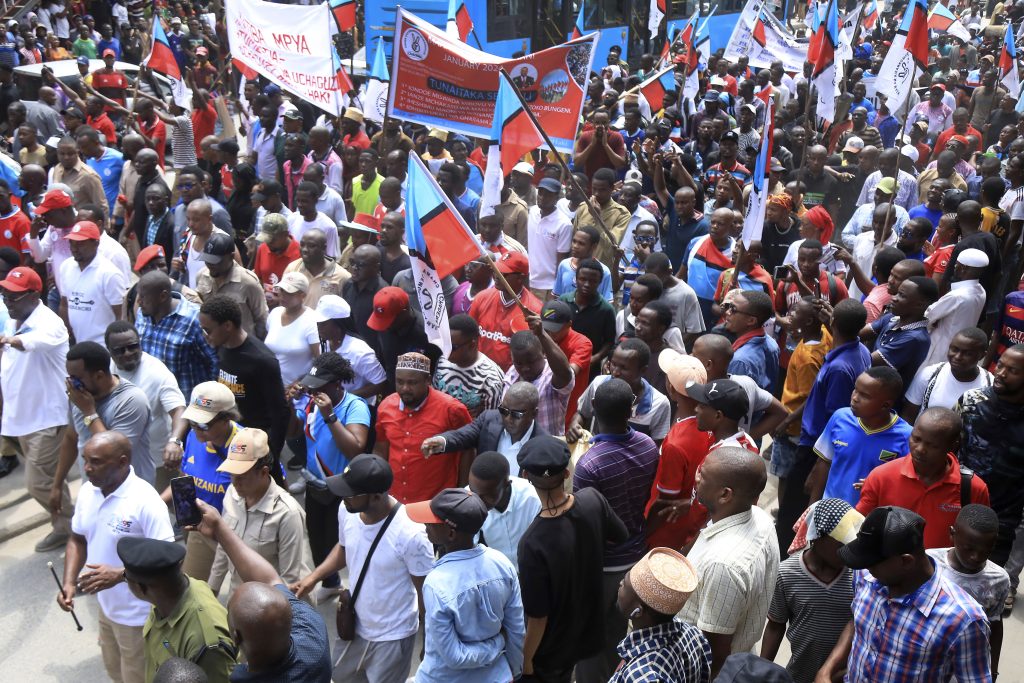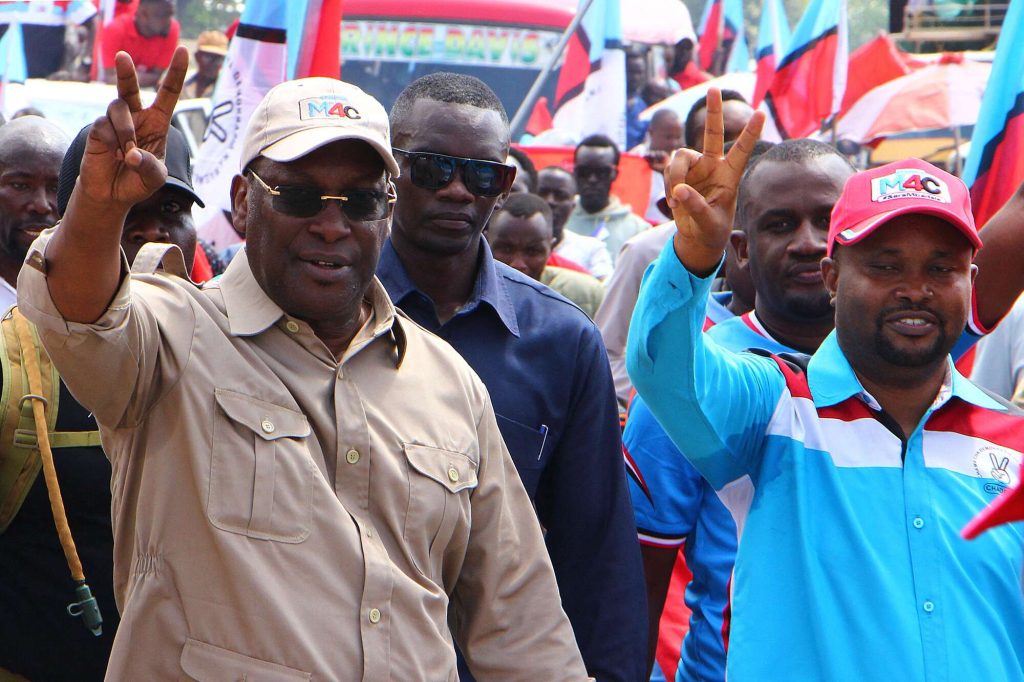Yesterday, on January 24, 2024, CHADEMA conducted its peaceful political demonstrations that agitated for election law reforms. While the relevant parliamentary Committee has been collating public opinions, CHADEMA distrusts whether it will lead to meaningful election law reforms.
Hence, mobilizing their ardent followers to express their frustration about election laws through political demonstrations. Maybe we should skip the ramifications of election law reforms and investigate whether political protests organized by CHADEMA have a chance to pressure the government to cave into their demands.
The elections of 2019 and 2020 have galvanized significant opposition political parties to draw their political daggers against what they perceive are election laws that have been purposed to edge them out of the ballot box regardless of how the electorate cast their votes.
In the 2019 and 2020 elections, the opposition did not fare well in the polls, explaining why they have a giant axe to grind against the government. CHADEMA is no stranger to demos, and their success at rallying her supporters generated mixed outcomes.

Since 2004, CHADEMA has conducted 7 operations, and it is unclear whether those operations have achieved their targets. We shall revisit those operations to determine whether they reaped some tangible gains.
All those seven operations coincided with CHADEMA’s top leadership arrival at the summit of Aikael Freeman Mbowe, who has been there since 2004. The seven operations were named as follows: “Oparesheni Kimya Kimya”, “Oparesheni Chadema ni Tawi”, “Sangara”, “Chadema ni Msingi”, “Vuguvugu la Mabadiliko: M4C”, “Oparesheni Mshike Mshike” and “Oparesheni Kata Funua”.
READ RELATED: The 2024 Local Government Elections as a Precursor to the 2025 General Elections: What Can We Expect?
a. Oparesheni Kimya Kimya
Operesheni Kimya Kimya aimed to search for top talent from the universities. This operation aimed to convince university students with political talent to join CHADEMA. According to CHADEMA Communications and Foreign Affairs, John Mrema told the daily newspaper that the process was successful because the party was able to recruit notable politicians such as Halima Mdee, Zitto Kabwe and Anthony Komu, Albert Msando, John Mrema, John Mnyika, Mhonga Said.
According to Mrema, CHADEMA, before the 2005 elections, had 6 members of Parliament (MPs) with constituencies as follows: Freeman Mbowe for Hai, Wilbard Slaa for Karatu, Philemon Samburo for Moshi Mjini, Dr Aman Kaborou for Kigoma Mjini, and Grace Kiwelu for women special seats.
b. Oparesheni CHADEMA ni Tawi (2006 – 2008)
According to John Mrema, this operation was to implement her constitutional mandate to spread and strengthen the party at the grassroots level and bring it closer to the rank and file. He said the operation was successful.
c. Operesheni Sangara (2008 – 2010)
This operation was a follow-up to the Operesheni CHADEMA ni Tawi. It was specifically targeted to win the by-election of Tarime Mjini and popularize the party in the Lake region. The operation name of Sangara is Kiswahili in English. It is known as the Nile Perch, a delicacy fish in Lake Victoria, located in the Lake zone.
Apart from Sangara being a main staple in the Lake region, it was picked as their operation clarion because the fish’s predatory nature of eating smaller fishes in the Lake captured CHADEMA’s desire to decry official graft. The operation objective was also to clamour for the end of mega corruption like those allegedly of EPA and Buzwagi mining.
That operation discovered political talents such as Vincent Nyerere, Ezekiah Wenje, the late Alphonse Mawazo, and Mwita Waitara. In two by-elections of Busanda and West Biharamulo, CHADEMA argued that through this operation, they could turn the political tide and make those elections a toss-up: Highly competitive, unlike in the past where CCM cake walked through them.
In Parliament, Dr Wilbard Slaa tabled a list of shame that named suspects allegedly involved in mega corruption fleecing substantial amounts of money from the public coffers.
d. CHADEMA ni Msingi (2010 – 2012)
They agitated for pluralism through a clamour for constitutional reforms in this operation. The establishment of this CHADEMA at cell levels was achieved. And, through this campaign, they claimed the then president Jakaya Kikwete complained publicly about political demos and had an agenda to oust him from power.
Hon. Kikwete summoned the opposition to the State House and agreed to initiate constitutional reforms through the legislative effort that formed a Constitution Committee that collected views from almost the entire country. The Committee used those views to prepare an approved constitutional draft, albeit with minor alterations by the constituency assembly.
e. Vuguvugu la Mabadiliko (2012 – 2014)
This operation was a reaction against the constituency assembly that, according to CHADEMA, had not accommodated the views of the wananchi in the final constitutional draft. They won 33% of the local government in this operation’s villages, streets and cells. During this period, Umoja wa Katiba ya Wananchi (UKAWA) was formed as a constitutional pressure group to ensure citizens’ views were included in the final constitutional draft.
f. Oparesheni Mshike Mshike (2014 – 2015)
This operation helped CHADEMA to announce the mayor of Dar es Salaam for the first time.
G. Oparesheni Kata Funua (2017 – 2020)
This operation reacted to The Late President John Magufuli’s unilateral ban against public political party activities. So, this operation was to work through party internal organs across the whole country and in the zones. That tactic allowed Chadema to continue performing her political agitation without major clashes and confrontations with the authorities.
Performance after elections:
CHADEMA’s proportion of parliamentary votes in 1995 left her number 5 in the overall ranking of franchises won. They dropped one position to 6th in 2000, moved up to 3rd in 2005, and from 2010 to 2020, maintained a second position behind the ruling party, Chama cha Mapinduzi (CCM), in overall parliamentary votes won. The number of councillors grew from 72 to 102 in 2010.
Our Assessment
In 1995, CHADEMA won 4 (6.16%) parliamentary seats. In 2000, they won 5 (4.23%) out of 285 parliamentary seats, 11 (8.2%) seats In 2005 out of 285, 48 (23.86%) parliamentary seats in 2010 out of 323, 73 seats (31.75%) out of 393 and 20 seats (13.04%) out of 393.
While the party may claim these operations were a success, their performance in elections registered mixed results. The best outcomes happened in 2015 when the then-former Premier Edward Lowassa crossed party lines from CCM to CHADEMA. Even Chairperson Mbowe’s main reason for handing the presidential ticket to Lowassa was that he was coming with millions of his supporters.
The number of CHADEMA’s sponsored candidates has indeed increased since 2005, and now it is the main opposition party whose expansive political fortunes depend on what happens to the election laws.
Suppose Parliament ratifies the proposed election laws without significant alterations. In that case, CHADEMA is apprehensive that election vices she experienced in 2020, in particular, might be repeated to her anguish in the 2024/25 elections, dilating why she is now carrying out this demo.
The history of political protests to change public policy is not straightforward. While Operation Sangara pushed CCM directly to a negotiation table today, the proposed constitutional draft is not yet legislated as the law of the land.
What the government has done by permitting political demonstrations clamouring for a new election regime may have hijacked the opposition chief’s claim that there is no political pluralism. One of the CCM members of Parliament has warned CHADEMA that political demonstrations will not shape the parliamentary debates!
At the heart of CHADEMA’s strategy will be who will support their protest of electoral imbalances. In politics, numbers matter. If they can pull over a million to march to the political rally, CCM must take notice and upend her recalcitrant stance. And some electoral reforms will be ushered in.
Minimum expectations are the de-politicization of the National Electoral Commission of Tanzania (NEC) by clipping presidential powers to pick the commissioners and no public servants, including judges, to have anything to do with the elections commission.
We are all watching the game of numbers, how it will unfold today, and whether it can tilt the parliamentary debates concerning these laws.

